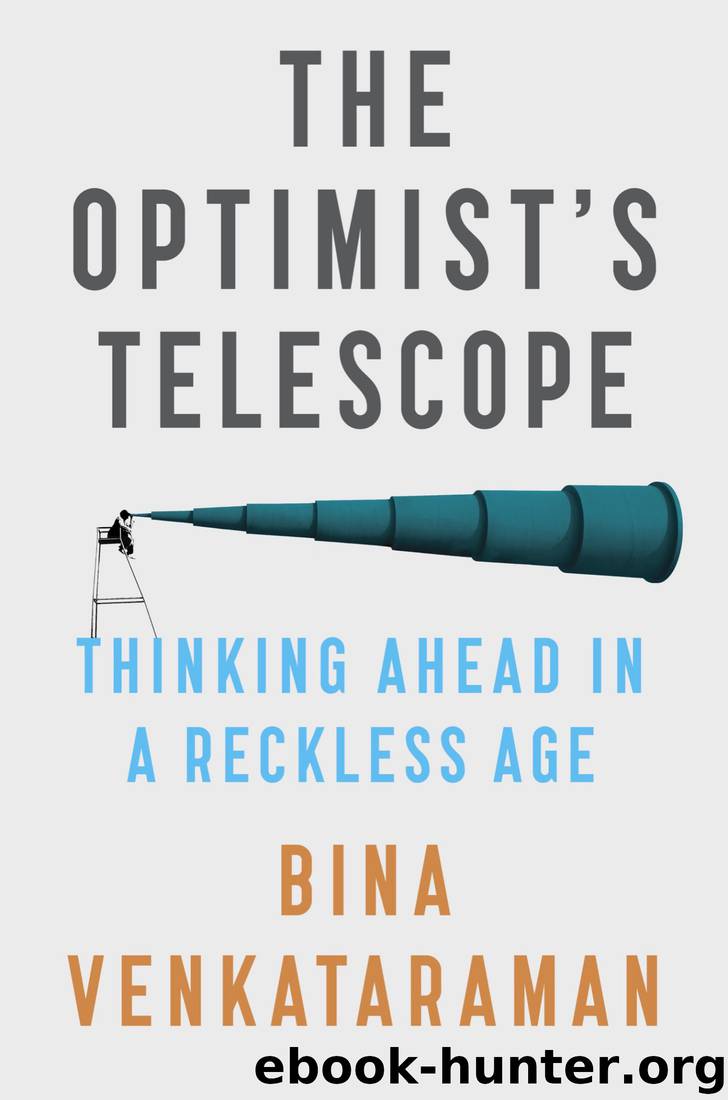The Optimist's Telescope: Thinking Ahead in a Reckless Age by Bina Venkataraman

Author:Bina Venkataraman
Language: eng
Format: epub
Publisher: Riverhead Books
Published: 2019-08-26T23:00:00+00:00
* * *
—
It might not be possible to create short-term rewards, or glitter bombs on long roads, for everything that an organization needs to do over time. But it might be possible in some instances to create an enticing fantasy of the future that motivates people in the present. This is, in fact, what Timothy Flacke did with prize-linked savings. Not all the people who save through such programs win the lottery, but most make wise decisions about their own future because the prospect of winning the lottery—however unlikely—holds sway in the present.
It is the illusion of what we might become that draws people to Las Vegas, and to gamble away our money at the roulette wheel or slot machines. From the tarmac at McCarran International Airport, you can see the casinos of Las Vegas Boulevard rise in the distance—like mountains beckoning conquest. Replicas of New York’s Empire State and Chrysler buildings seem to both mock and pay tribute to the originals. The Mandalay Bay resort shimmers in the desert sun like a sequined dress. Just to glimpse that city is to believe in the irrational possibility of remaking yourself, of getting rich quick, of getting away with transgression.
Just as the subculture of professional poker holds insights about resisting instant gratification, there is something to be learned from the very design of Las Vegas and its casinos, from its conjuring of an illusion—like a magician pulling a rabbit out of a hat.
Historic feats of human ingenuity have arisen from a strategy that resembles the Las Vegas illusion.
In 1919, a French-American hotel owner named Raymond Orteig put up a prize to encourage someone to accomplish the imagined feat of flying alone nonstop across the Atlantic Ocean, between New York and Paris. No one had made a solo transatlantic flight. There were multiple failed attempts over the course of eight years, including deadly crashes, in pursuit of the prize. The $25,000 Orteig Prize set forth a challenge that had yet to be overcome, as if erecting a mountain to capture the imagination of adventuresome climbers. None knew if they would succeed, yet they tried anyway, at their own risk and expense.
In 1927, Charles Lindbergh made the successful solo flight in the Spirit of St. Louis and won the prize. He became an instant global hero, and shortly thereafter, transatlantic air travel became a booming business.
The use of prize competitions to spur collective imagination is even older than that, however. In 1714, Isaac Newton and the British Crown put up the Longitude Prize—a challenge to improve naval navigation with a prize purse of £20,000. Ship captains used the sun or the North Star to calculate their latitude, but did not have a way of reliably calculating longitude at sea—that is, their exact position east or west of where they started. Ships would frequently run aground or crash into rock formations, sending crews overboard.
To the surprise of the era’s scientific establishment, a clockmaker name John Harrison solved the problem by inventing a prototype
Download
This site does not store any files on its server. We only index and link to content provided by other sites. Please contact the content providers to delete copyright contents if any and email us, we'll remove relevant links or contents immediately.
Hit Refresh by Satya Nadella(9123)
The Compound Effect by Darren Hardy(8941)
Change Your Questions, Change Your Life by Marilee Adams(7757)
Nudge - Improving Decisions about Health, Wealth, and Happiness by Thaler Sunstein(7689)
The Black Swan by Nassim Nicholas Taleb(7105)
Deep Work by Cal Newport(7063)
Rich Dad Poor Dad by Robert T. Kiyosaki(6603)
Daring Greatly by Brene Brown(6501)
Principles: Life and Work by Ray Dalio(6416)
Playing to Win_ How Strategy Really Works by A.G. Lafley & Roger L. Martin(6229)
Man-made Catastrophes and Risk Information Concealment by Dmitry Chernov & Didier Sornette(6002)
Big Magic: Creative Living Beyond Fear by Elizabeth Gilbert(5754)
Digital Minimalism by Cal Newport;(5748)
The Myth of the Strong Leader by Archie Brown(5496)
The Slight Edge by Jeff Olson(5410)
Discipline Equals Freedom by Jocko Willink(5378)
The Motivation Myth by Jeff Haden(5203)
The Laws of Human Nature by Robert Greene(5171)
Stone's Rules by Roger Stone(5080)
